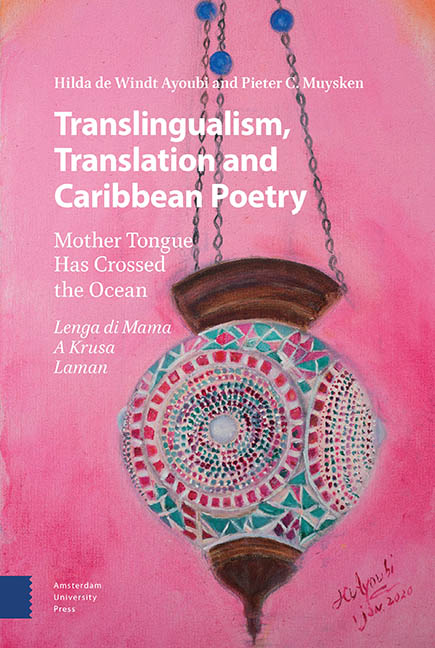Book contents
- Frontmatter
- Dedication
- Contents
- How to Navigate This Book: Kon Nabegá den e Buki akí
- Acknowledgements
- Preface
- Part 1 Introducing the Mother Tongue: Introdukshon di Lenga di Mama
- Part 2 The Poem “Lenga di Mama” and its Translations, Comments and Language Descriptions E Poema “Lenga di Mama” i su Tradukshonnan i Komentario i Deskripshon di e Idiomanan
- Part 3 The Poem “E ‘papiá’ di Papiamentu” and its Translations E Poema “E ‘papiá’ di Papiamentu” i su Tradukshonnan
- Part 4 The Poem “Papiamentu pa Semper” and its Translations E Poema “Papiamentu pa Semper” i su Tradukshonnan: The Translations and Editing of the Poem Hilda de Windt Ayoubi and Pieter Muysken (for Dutch)
- Part 5 The Poem “Riba Ala di Lenga di Mama” and its Translations E Poema “Riba Ala di Lenga di Mama” i su Tradukshonnan
- Part 6 Commentary: Komentario
- Note on the Authors: Informashon tokante e Outornan
- Index: Índise
Creole Languages /Idioma Krioyo
Published online by Cambridge University Press: 15 September 2022
- Frontmatter
- Dedication
- Contents
- How to Navigate This Book: Kon Nabegá den e Buki akí
- Acknowledgements
- Preface
- Part 1 Introducing the Mother Tongue: Introdukshon di Lenga di Mama
- Part 2 The Poem “Lenga di Mama” and its Translations, Comments and Language Descriptions E Poema “Lenga di Mama” i su Tradukshonnan i Komentario i Deskripshon di e Idiomanan
- Part 3 The Poem “E ‘papiá’ di Papiamentu” and its Translations E Poema “E ‘papiá’ di Papiamentu” i su Tradukshonnan
- Part 4 The Poem “Papiamentu pa Semper” and its Translations E Poema “Papiamentu pa Semper” i su Tradukshonnan: The Translations and Editing of the Poem Hilda de Windt Ayoubi and Pieter Muysken (for Dutch)
- Part 5 The Poem “Riba Ala di Lenga di Mama” and its Translations E Poema “Riba Ala di Lenga di Mama” i su Tradukshonnan
- Part 6 Commentary: Komentario
- Note on the Authors: Informashon tokante e Outornan
- Index: Índise
Summary
Abstract
This section contains translations into a numberof Creole languages from around the globe. Creolelanguages emerged in recent history, often as theresult of European colonial expansion and slaveryor other forms of enforced labor. There are over ahundred of these Creole languages, particularly inthe Caribbean, West Africa, the Indian Ocean, andthe Pacific. Generally, it concerns languages oflow social prestige and they are often spokenalongside European languages of high socialprestige. This also means that, generallyspeaking, there is little written literature inthe Creole languages, so the translations here areimportant in that they increase the range of textsin these languages and show how they can take aliterary form.
Keywords: Papiamento, Papiamentu,Creole, Caribbean, West Africa, Indian Ocean,Pacific Ocean, South America, Suriname
The words of the Creole languages can be similar tothose of certain European languages, the so-calledlexifier languages, but their grammar is oftenstrikingly different. Generally, there are fewerendings on verbs and nouns than in the Europeanlexifier languages, and meaning is often expressedwith separate particles, as we will see in thetranslations that follow. I will briefly discuss thelanguages in the order of the translations presentedin them. Pride of place is given, of course, toPapiamento.
Papiamento or Papiamentu is the mainlanguage of Aruba, Bonaire, and Curaçao, spokenalongside Dutch, English, Spanish, and otherlanguages. It is also spoken by emigrants from theislands in the Netherlands. Papiamento is a Creolelanguage with roots in the Cape Verdean islands,where African languages interacted with Portuguese.Slaves from Africa brought the language to theCaribbean. On Curaçao, Aruba and Bonaire, Spanishand Dutch were mixed with the language. It is thushighly mixed, but it has a long tradition of writtentexts, dating back to the eighteenth century.
Typical features of Papiamento include tones todistinguish several meanings. For instance, mata [high low tones] means“plant”; and mata [lowhigh tones] means “to kill”. Most words are shortand meaning is often expressed with separateparticles.
- Type
- Chapter
- Information
- Translingualism, Translation and Caribbean PoetryMother Tongue Has Crossed the Ocean, pp. 57 - 86Publisher: Amsterdam University PressPrint publication year: 2022



